Moving to the Netherlands
Many UK residents have and still are making the move to the Netherlands, a welcoming and safe place for UK expats. If you are moving to the Netherlands for work, you are sure to enjoy their strong belief in a work-life balance, with short business hours and strong social relationships being common in the workplace. The liberal, friendly and straightforward atmosphere is home to 17 million people, making the Netherlands one of the most densely populated countries in the world. And though the official language is Dutch, English-speakers will feel right at home with much of the population speaking English as a second language.
While most expats move to Amsterdam, the rest of the country also shares the strong culture, family loyalty and beautiful scenery found in the capital. The Hague, the country’s third-largest city, is the seat of the country’s government and, despite its small-town atmosphere, is an international centre of diplomacy. Nearby, Rotterdam is home to the largest port in the world. Due to its destruction in the second world war, visitors will be surprised at the modernity of Rotterdam compared to the other cities in the Netherlands.
Preparing to go
If you are relocating with your current job, your employer may assist in acquiring a passport, a visa and any permits that you will need. Your country’s embassy will be the best up-to-date source of information for your move.
Passports – It’s always necessary when travelling to ensure all accompanying parties have a passport that will be valid for the trip at hand. This is equally important when relocating abroad.
Visas – As Britain is no longer in the European Union, the visa requirements have recently changed for moving to the Netherlands.
UK nationals moving to the Netherlands must complete an application for temporary or permanent residency. Before beginning your online application, you will need to have certain documents to hand, including:
- A copy of your passport
- Copies of other required documents – read IND guidance on this
- BSN number
- DigiD with SMS code or DidiD app – apply for this on www.digid.nl/en
- iDEAL (payment method) to pay for the application – Dutch bank account needed
For more information on how we can assist you in your visa process, read about our Relocation Services.
Citizen service number (BSN) – Everyone living in the Netherlands must have a BSN, or Burgerservicenummer, which is a citizen service number. To receive a BSN you must register at your local authority within 5 days of your arrival. This number is crucial for many other services in the Netherlands, including opening a bank account and arranging health insurance for your stay.
For more information, read the guidance on BSNs from the Dutch government.
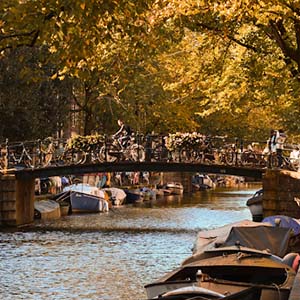
Finding a job in the Netherlands
Are you considering moving to the Netherlands? If you are not a fluent Dutch speaker, you might be after English speaking jobs. Check out Reed, Young Capital and Job In Amsterdam websites or hop on a plane and visit recruitment agencies in the Netherlands.
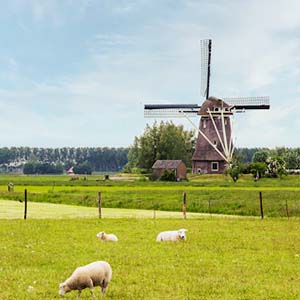
Transporting household goods to the Netherlands
There may be limitations placed on your household shipment by your employer, so it’s a good idea to check these before deciding to include household appliances or vehicles in your shipment. It’s also important to consider your accommodation, which may well be smaller in the Netherlands, when shipping furniture and soft furnishings into the country.
Regardless of your home country, the importation of your household goods into the Netherlands is duty-free. If arriving from outside the EU, only your first shipment is accepted duty-free, so it’s advised to fit all your items inside one shipment to the country. For those arriving from non-EU countries, which now includes Britain, there are extra requirements to fulfil before transporting your shipment:
- Apply for an import permit in advance – “Single Administrative Document”
- Provide a list of your shipped items
- Must have had ownership of your shipped items for at least 6 months prior
- Must have been a resident for 12 months in the country from which you are travelling – and actually present there for at least half of that time
Customs restrictions
Certain items require inspection or are prohibited from passing through customs.
Flower bulbs being sent into or out of the country are subject to inspection. If unsure, Dutch flower-bulb dealers are well versed on the restrictions and can arrange shipment if required. Prohibited items include CB radios, weapons, bombs, munitions, narcotics, imitation brand clothing etc, unpreserved meat, fruits and any items including protected wildlife. Despite there being no currency restrictions, amounts over €10,000 must be declared at Customs.
For more information on currency and tax, visit the Dutch customs and administration website.
Taking your vehicle
If your vehicle meets the following requirements, it is permitted to enter the Netherlands tax-free:
- Declared as part of your household shipment
- Within 10 days of arrival, the nearest customs office must be notified
- The vehicle has been owned for at least 6 months prior and has been driven in the country from which you are travelling
- The vehicle is used for personal use only for the first 12 months of residence
- Any lease, loan or sale of the vehicle to a third party will revoke its tax-free status
As in the UK, road tax must be paid before the vehicle can be driven in the Netherlands. After passing local inspection, ensuring that the car meets safety and emissions regulations, you must also obtain local plates and registration. Alternatively, cars are available for purchase locally from dealers or privately.
Taking your pet
As the climate in the Netherlands is much like the UK, it’s a perfect place for pets. An extremely safe environment is provided by the great levels of public sanitation and a good level of veterinary care is provided. Pets are generally well-accepted by the Dutch population, and the process is made easier with no import permit or quarantine period required.
Upon arrival, cats and dogs may be examined by a State Veterinary Officer to confirm their health levels. You should give notice of your pet’s arrival time in advance so that authorities can be on hand. Your pet’s microchip must contain the animal’s full identification information. Dogs must be registered in The Netherlands within two weeks of arrival.
A pet passport issued in Great Britain is no longer accepted on travel to the EU. A Health certificate is required to be issued no later than 10 days before departure and should be endorsed by your government agricultural agency. Dogs, cats, and ferrets must also have rabies vaccinations and you must have two original endorsed certificates of rabies vaccinations. All vaccinations, including rabies, should be administered at least 30 days but not more than 180 days before departure to The Netherlands.
For more details, view the guidance on the UK Government’s website.
Finances
Exchange and Currency – The Netherlands use the Euro (€) as their currency. All commercial banks have exchange services, while less favourable rates are offered at hotels and post offices around the country. It’s recommended to exchange large amounts of money at a time to minimise the interest you must pay upon exchange.
Banking Services – Long term visitors or residents in The Netherlands are advised to open a Euro bank account, and there are bank branches throughout the country. Quick transfers to bank accounts in your home country are possible from Dutch bank accounts, while checks might take longer to process. Debit cards are widely used and are more popular than cash or credit cards.
Expats opening bank accounts in the Netherlands must report to the local bank manager and will require certain documents to be present, including:
- Passport (and co-signers passport for joint accounts)
- Proof of address
- Citizen service number (BSN)
- Some people require proof of employment/income
Your bank-related information is sometimes available in English, and it’s important that you understand everything before signing any documentation.
Dutch banks offer a variety of services, and Internet banking services are rapidly increasing in popularity – already almost 90% of the Dutch population use online banking. Banks are usually open from 9am to 5pm on weekdays, but might open late on Mondays.
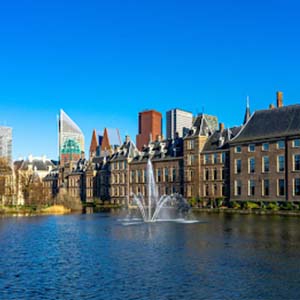
Medical Insurance and Healthcare
The Dutch healthcare system provides an excellent quality of preventative as well as curative care. If a medical emergency arises, the embassies are in contact with local healthcare professionals and many doctors speak English in The Netherlands.
If your EHIC card is still valid, this should give you access to basic medical treatment in The Netherlands if you are a student or a posted worker. For people moving to the Netherlands from the UK permanently, you will need to arrange health insurance within 4 months of you arriving in the country. Your employer might be able to offer you a discount on health insurance. If you are a UK national receiving a pension, you might be eligible for free healthcare. For more details, visit the UK government’s guide to Healthcare in the Netherlands.
Finding Accommodation
While not legally necessary, many people moving to the Netherlands choose to rent or buy through an estate agent to ease the process and avoid complexities. It is also common for expats to rent property rather than to buy. Despite no legal restrictions preventing foreigners from buying property, additional fees can raise the overall buying price to over 10% more than the original sale price.
If rental accommodation is not secured by your employing company, you should allow negotiations to take place through a realtor and be aware that in The Netherlands an oral contract can be legally binding. Before moving in, an inventory of the condition of all furnishings will be conducted. Tenants often do thorough inspections, checking for leaks, cracks and main switches. In a few cases, it will be necessary to obtain permission from local authorities before renting property, including proving your need for accommodation.
Rental leases typically cover an indefinite period and rates are fixed for the first year. The rental price will also often exclude utilities, so bear this in mind when looking for housing.
Housing Areas
In the Netherlands, residential areas are usually either in one of the major cities in the country or situated in small towns on the outskirts of cities. Suburbs are not common, as each town is considered independent of surrounding areas. Places to obtain permits and registrations are typically found at the centre of each small town. Property in the centre of major cities is in limited supply and therefore quite expensive. Prices are lower and there is more property to choose from in small towns outside cities. The excellent public transport in The Netherlands means that commuting to more central districts couldn’t be easier.
In the vicinity of Amsterdam, Rotterdam and The Hague, residential areas that are not too expensive include Amsterdam West, Amsterdam New South, Amsterdam East, parts of Amstelveen and Haarlem, Buitenveldert, Hoofddorp, Uithoorn, Utrecht and The Hague.
Short term housing
As long-term tenants are usually most sought after by landlords, there are not many temporary furnished accommodations available in most of the Netherlands. Locating accommodation for short-term stays is offered as a specialist service by some estate agents but contacting a relocation consultant could be the best way.
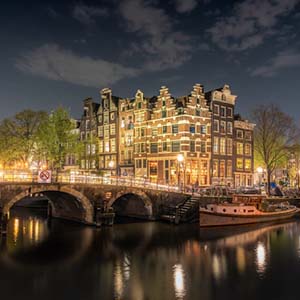
Getting around in The Netherlands
As The Netherlands does not accept the International Driving Permit (IPD), when moving to The Netherlands from the UK you will need to apply for a Dutch driver’s license at the Netherlands Vehicle Authority. If your stay is business-related and shorter than 6 months, non-EU licenses are valid for driving in this period. It is possible to exchange some non-EU driving licenses for a Dutch equivalent, so read the guidance from the Netherlands Authority on license exchange.
Do I need a car in the Netherlands?
Deciding whether to drive when moving to the Netherlands can be a difficult decision and will depend on many factors. It’s important to consider where exactly you will be moving to, as the need for a car will change depending on your location.
Public transport in the Netherlands, mainly in and around the cities, is excellent. National rail connections are well established, as well as buses, streetcars and in some cities even subway lines. If you can use the public transport system, or bicycles, to commute and travel where necessary, you might consider not obtaining a vehicle of your own. Taxis are also common, while expensive, for longer distances. Parking in the Netherlands is something to consider, however, as permits can take years to be accepted and commercial parking can drum up some serious costs.
Driving in the Netherlands is straightforward, with a modern network of roads in cities as well as in the countryside. It’s important to follow the rules of the road, which can be provided in English by the Central Bureau Rijvaardigheidsbewijzen.
Insuring a Vehicle in the Netherlands
In the Netherlands, obtaining third-party liability insurance from Dutch-licensed companies is mandatory. Upon arrival, you can get temporary coverage valid for up to 15 days, available at currency-exchange offices. As well as third-party liability insurance, All-Risk insurance will cover third-party damages as well as your own damages, and All-Risk Plus covers even more. Insurance rates are high, however, there are significant reductions when a driver submits no claims for several years.
Social Life
If you relocate to the Netherlands, you will find that there is an active expatriate community, so settling in will be easy. There are plenty of activities and organisations to help with acclimatising to your new environment. Whatever you are interested in, you will find a club dedicated to hobbies and socialising. A wide range of sports, performing arts venues, the flower festival and more will provide something for the whole family to enjoy.
While some activities will help you meet other expatriates, the Dutch are eager to share their culture and will make great new friendships outside of the expat community. Furthermore, the Chambers of Commerce can provide useful social and business contacts.
There are plenty of places to socialise, including restaurants, bars, cafes, discos and even casinos. Restaurants include a wide range of cuisines, including Greek, Mexican and Egyptian, with many Indonesian and Indian restaurants. The Dutch typically eat dinner early, with most kitchens shutting by 9:30 pm. Dutch specialities are also available, such as Erwtensoep, a thick pea soup with sausage, or gerookte paling, smoked eel, on special occasions.
Social Customs
The Dutch are warm and welcoming people, meaning that an invitation to someone’s home will not be uncommon. Bear in mind that they are also quite formal and conventional, meaning that arriving punctually and not showing up uninvited is customary. Pay attention to the dress code of the event and note that it is polite to shake everyone’s hand upon arrival. Gifts of flowers for the hostess will always be well received. Reciprocating invitations is also common practice.
When talking to someone, chewing gum, standing with your hands in your pockets or avoiding eye contact could all be construed as rude to a Dutch person. Avoid touching your conversation partner and be warned that they will likely stand further away from you than you expect.
Alcohol and Smoking
Like the British, the Dutch will drink beers or stronger alcohol in social situations. If you drink to excess, you will be considered rude by your peers. Heavy fines are applied to people who drive under the influence, so this is to be avoided, as in much of Europe. Be aware that there is no legal alcohol consumption age, however, weaker alcohols (up to 15%) can only be purchased from 16, and all other alcohols from 18.
Around 20% of the Dutch population smoke cigarettes. Like in many other countries, smoking in public places is banned, and you should ask your peers in private gatherings before you start smoking.
So-called “soft drugs”, like marijuana, are generally acceptable for Dutch people to use and are often smoked quite publicly as the police turn a blind eye. In theory, harder drugs are far less acceptable, however, you will find that many cities have an area, such as the Red-Light District in Amsterdam, where the police do not enforce these laws. However, as a foreigner, your residency permit or visitor status is at stake if you get caught using illegal drugs.
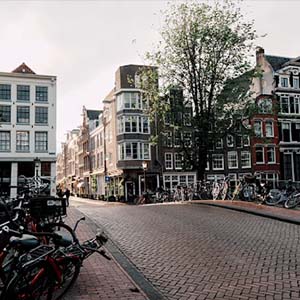
Religious Worship
In the Netherlands, there is complete freedom of religion. There are services in English and, particularly in cities, many international denominations are present at worship. To find information about places of worship for you and your family, contact your nearest consulate or embassy.
For more information on relocating, check out our international relocation guides with checklists for your preparation.
Interested in information on another country? Take a look at our other International Relocation guides.
Great customer Experiences start here
Very pleasent and helpful. Nothing too much trouble.
Mr M H moved from London, UK to Toronto, Canada
Very helpful and patient even when things got packed that we had to get out again!
Mr M E moved from Enfield, UK to Dorset, UK
Thanks to Graham, Nick and the entire crew!
Mr C D M moved from UK to Singapore
Friendly and helpful crew.
Ms T W moved from USA to Cambridgeshire, UK
